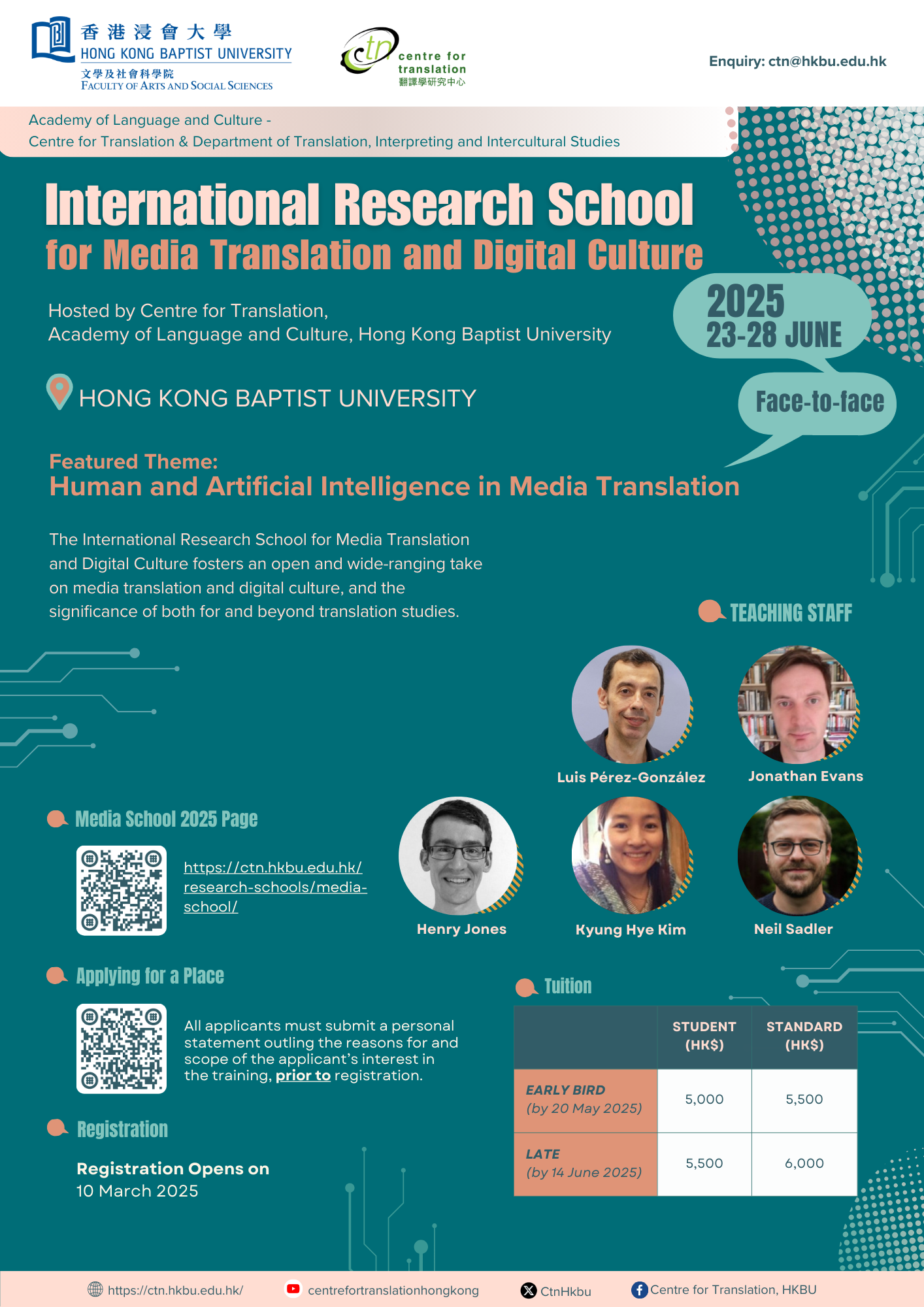Media School
The terms audiovisual translation, media translation and translation technologies have acquired and continue to enjoy great visibility in the field of translation studies. This International Research School for Media Translation and Digital Culture (MTDC) fosters an open and wide-ranging take on media translation and digital culture, and the significance of both for and beyond translation studies; encourages cross-fertilization between the disciplinary sub-fields designated by the above terms; and addresses the new theoretical and methodological tools that translation scholars need in order to understand the strategic and catalyzing role played by translation in relation to a number of issues, including the following:
- Reconfiguring the ecology of networked media – from mainstream news organizations to citizen journalism outlets; from printed written articles to multimodal assemblages; from professional reportage to amateur coverage of conflicts and natural disasters;
- (Re)producing shifting public discourses about cosmopolitanism, gender, nation, expertise, fandom or activism – among other core issues;
- Developing more collaborative, participatory and deliberative processes of community formation, both online and on the ground;
- Enabling disciplinary discourses and developments in the fields of multimodality, media sociology, cultural studies, journalism, globalization studies and critical theories of communication technology.
The School is aimed at an international audience and primarily addresses the needs of doctoral and early career researchers in translation, interpreting and intercultural studies, as well as more experienced academics who are new to the discipline or interested in engaging with recent developments in the field. It contributes to advancing the study of translation in the context of digital (audiovisual) media and online spaces.
The School takes place once every two years at Hong Kong Baptist University, rotating with the Translation Research Summer School.
Conceptual Remit
The School focuses on a range of related issues. The list below is meant as an indicative rather than exhaustive survey of such issues and themes:
- Translation, materiality and mediality: print culture, mass media culture, digital media culture;
- Media and globalization: instantaneity, deterritorialization and audience fragmentation;
- Translation of multimodal texts;
- Translation and self-mediation: participation, remediation and bricolage;
- Citizen media and amateur forms of translation;
- Media translation in situations of conflict and natural disasters;
- Social networking: communities and networks;
- Critical approaches to new technologies: questions of ethics, critical approaches to tech usage, how tech is changing conceptions of labour, etc.;
- New contexts of production and consumption in media translation: crowdsourcing and activism.

Syllabus and Organization
The School consists of five modules:
Module 1
Theoretical Approaches
2 x 90-minute sessions (A, B)
Module 2
Research Methods
2 x 90-minute sessions (A, B)
Module 3
Research Design & Dynamics
2 x 90-minute sessions (A, B)
Module 4
Featured Theme
2 x 90-minute sessions (A, B)
Module 5
Academic Career Development
2 x 90-minute sessions (A, B)
Each module encompasses three contact hours and approximately six hours of guided reading.
Group tutorials cover a range of topics and are designed to address themes that are relevant to participants’ current research, as outlined in their personal statements.
On the final day, students present their work to fellow students and staff and receive verbal feedback.
Pathways
Students of MTDC are allowed to choose one of two pathways:
Pathway 1
Pathway 2
- deliver a presentation of their proposed research project on the final day of the School;
- submit a research proposal (between 2,000 and 3,000 words long, excluding the bibliography) by the end of September;
- attend three group tutorials during the School.
Pathway 2 caters for participants working towards an attendance certificate only. Pathway 2 students
- choose whether they wish to attend tutorials during the school (they will have expressed their interest in doing so via their participation form);
- do not deliver a presentation nor submit a research proposal.
Presentation (Pathway 1)
Students in Pathway 1 will deliver a presentation of their research project on the final day of the School.
Presentations should last 10 minutes, followed by a 5-minute discussion session. They provide an opportunity for students to receive feedback from their peers and tutors in attendance.
Pre-School
As part of the application process, and prior to registration, all participants are required to submit a Personal Statement outlining the reasons for and scope of their interest in the topics to be covered in the School. In the event of oversubscription, preference will be given to applicants who, as part of their personal statement, can provide evidence of having undertaken research at postgraduate level of any aspect of the interface between translation studies and the media. All personal statements, to be reviewed by the School’s Academic Directors Luis Pérez-González & Kyung Hye Kim, should be submitted at this online platform.
Post-School
Core Staff
The School is staffed by a core group of visiting and local academics. Additional tutors are involved on a one-off basis on different years, as required by the relevant featured theme. Not all members of the core group will necessarily be involved in each session of the School.











